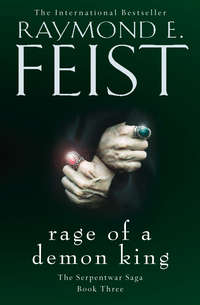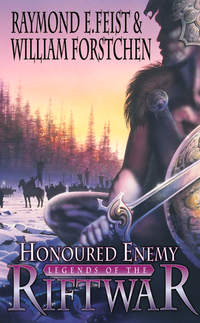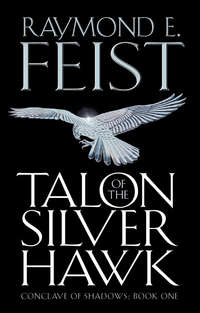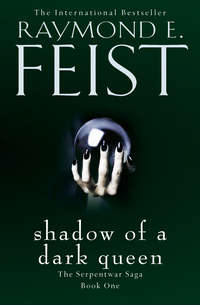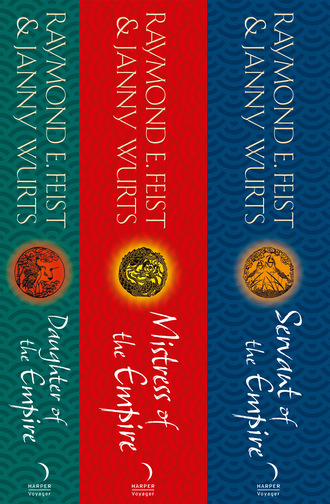
Полная версия
Mara felt a momentary pang of guilt. The presentation of a grandson should have been an occasion for joy, instead, in a moment tense with unspoken antagonism, Ayaki was passed into his grandfather’s outstretched arms. Engulfed in scented cloth and the sharp edges of gemstone decorations, the infant squirmed but did not cry. Tecuma regarded this stolid little face and said, ‘He looks like Bunto.’
Mara nodded in agreement.
After a long moment of cuddling the child, Tecuma returned him in cold silence. Mara immediately relinquished him to the custody of Nacoya, who settled him as she had the boy’s mother, after a mourning ritual many years before.
‘Take my son to his nursery,’ said the Lady of the Acoma. As the old nurse departed, Mara regarded the hostile face of her father-in-law. ‘I offer the hospitality of the house.’
‘No, daughter.’ Tecuma qualified the word, all tenderness gone with Ayaki. ‘I will not set foot in the house of my son’s murderess.’
Mara almost flinched. With great effort she managed an impassive reply. ‘Your son took his own life, my Lord, to satisfy the demands of honour.’
Tecuma bowed his head once, swiftly, in salute. ‘I know, Mara. But I also knew my son. Despite his ineptness as a ruler, even he would never have contrived that insult to the Warlord and his own father. Only you could have brought such a thing to pass.’ Something akin to respect coloured his manner for a brief instant. ‘I salute your brilliance in the Game of the Council, Mara of the Acoma’ – then his voice turned flint-hard – ‘but for this one bloody victory you shall pay in kind.’
Mara measured Tecuma and realized that grief and anger were making him say more than he might under normal circumstances. Inwardly she cautioned herself. ‘My Lord, I merely obeyed my husband and Lord and repeated to you the commands he gave me, before witnesses.’
Tecuma waved away the objection. ‘Enough. It does not matter. My grandson inherits the mantle of the Acoma, and he shall ensure a loyal tie between my house and his.’ At this a man stepped forward from the Anasati retinue, a thin, predatory fellow with shrewd eyes and a belt of enamelled caro hide. The Lord said, ‘This is Nalgara, who shall act on my behalf until Ayaki is of age.’
Mara was not caught off guard. ‘My Lord, no.’
Tecuma’s eyes narrowed. ‘I did not hear you say that.’
Mara resisted showing weakness by offering justification. ‘You will take this man with you when you leave.’
Armour rattled among the Anasati warriors as hands reached for weapons, and Tecuma’s arm trembled, ready to signal an attack. ‘Woman, you dare?’
Hoping that Lujan had had time to arm her own companies, Mara held her ground. ‘No, my Lord. I demand.’
Tecuma abandoned his pretence of politeness. ‘I shall decide how Ayaki’s legacy is to be managed. I am Lord of the Anasati.’
‘But these are Acoma lands,’ Mara interrupted, her voice ringing with an anger all her own. ‘My Lord of the Anasati seems to forget that his son was Lord of the Acoma. And the Acoma have never been, are not now, and shall never be vassals to the Anasati. Your grandson is now heir to the title of Lord. As his mother, I am again Ruling Lady of the Acoma until the day he comes of age.’
Tecuma’s face twisted with suppressed rage. ‘Woman, do not seek to anger me!’
‘It appears my Lord is already angry, so that what I say could have little consequence.’ Stalling for time, Mara searched for a glimpse of green between the weaponed ranks of the Anasati guard. But the retinue pressed too closely together to allow any view of Lujan’s men. She had no choice but to continue. ‘When Bunto assumed Acoma Lordship, he ceased to have any obligations to you save those he freely chose, as you must have known, Tecuma, for your son could not swear oath before the Acoma natami until you released him from fealty. Show me a document, any document, appointing you as guardian for Ayaki in the event of Bunto’s death and denying me my right to inherit. Then I will step aside. But without lawful evidence, you are not ruler of the Acoma.’
The slightest twitch of Tecuma’s lips revealed a frustration he dared not express.
Mara hastened to drive home her point, before the confrontation turned to violence. ‘We are not of the same clan, so you have no call upon the Acoma. You don’t even have a political claim on our loyalty. Bunto never sought to change our alliances, so the Acoma are still members of the Jade Eye Party, not the Imperial. You have no authority here, Tecuma.’ She motioned with her hand then, on faith, and to her immense relief Lujan and three dozen Acoma soldiers stepped forward, ready to defend their mistress. To the rear of Tecuma’s party, another fifty soldiers had gathered in battle armour, ready for instant action should there be cause. Mara finished with a smile of irony. ‘Once again I rule the Acoma, until Ayaki is twenty-five years of age.’
The Lord of the Anasati prepared to speak, but his adviser, Chumaka, intervened. ‘My Lord, she is correct. Such is the law.’
Balked, Tecuma paused a long minute, his eyes distant with calculation. ‘Then what of the boy if you die?’
In even tones Mara said, ‘Then Ayaki is ruler of the Acoma, as I was before the age of twenty-five, ready or not.’
Tecuma made a subtle gesture, indicating that Mara was once again a woman alone against enemies. ‘The boy will surely die.’
But the threat failed to move the young Lady, who stood defiantly straight. ‘At the hands of the Lord of the Minwanabi, or some other seeking to rise over Acoma bodies, perhaps.’
Tecuma conceded defeat. ‘Very well, daughter. You have made your point. I shall endeavour to keep you alive, at least until Ayaki comes to his majority. But if you make any move that I judge a menace to the Anasati –’
‘Do not threaten me in my own house, father of my husband,’ Mara warned. ‘I could end this here and now.’ She pointed to Lujan and the soldiers who waited ready to answer their mistress’s command. The odds against Tecuma were now overwhelming, with only a score of soldiers to protect him against the possibility of attack by two companies. Were he to press the issue, he could die very quickly.
Mara regarded the stiff features of her father-in-law. ‘I have no wish to be at odds with you, Tecuma. Your differences with my father were strictly political.’ With a sigh more eloquent than words, she shook her head. ‘We both know that what I have done was also a matter of politics.
‘Should you die here … Jingu of the Minwanabi would be without any real rival in the game. No, I do not ask you to be my ally. I just wish you not to be my foe.’
The fist Tecuma had raised to signal his soldiers relaxed and lowered. He regarded Mara keenly. ‘Minwanabi … yes. Already he thinks himself powerful enough to move against me.’ The Lord of the Anasati sighed, at last acknowledging the quiet strength in Mara’s stance. ‘Perhaps you can make some difference.’ He shook his head. ‘I underestimated you. Perhaps Jingu will do likewise.’
After a silent minute he bowed to take his leave. ‘Very well, Mara. You have my word on this, then; so long as Ayaki lives, I will not oppose you when you seek to discomfort the Minwanabi. But I make no such assurances where Anasati interests are concerned. We still have many differences. But once my grandson inherits the mantle of the Acoma, Lady, you shall find my memory is long. Should any harm befall him before then, from that instant your life will be measured in minutes.’
Curtly Tecuma signalled his retinue to assemble for the journey back to Sulan-Qu. Wind tugged at the officers’ plumes, and streamed through Mara’s dark hair as she watched the Anasati Lord and his followers muster and march from the yard. The first part of her plan had been successful. For a time the second most powerful of her father’s enemies had been neutralized; even more, made a reluctant ally. There were not many in the Empire who would tempt Tecuma’s wrath by harming his grandson; only the Lords of the Keda, Xacatecas, and Minwanabi, and perhaps one or two others. Most would refrain, if only to see that the Lord of the Minwanabi did not grow too powerful. As Jingu’s enemy, Mara had value, if only to keep him occupied. And despite the protection she had garnered from Tecuma, Mara knew the blood feud would go on. She had only forced her family’s greatest foe to move cautiously. No more bungled assassinations, of that she was certain. Attack would come, but for the first time since Keyoke had fetched her from the temple, the Lady of the Acoma felt that she had gained a measure of time. She must be diligent about how she used it.
Turning her mind to the tasks before her, Mara dismissed Lujan and his warriors. With Keyoke and Papewaio at her side, she returned to the cool and the comfort of her chamber. First upon her agenda the next day was a journey to Sulan-Qu, for if Arakasi’s information was correct, a Minwanabi spy resided in the town house owned by the Acoma. Buntokapi’s concubine, Teani, must be dealt with at the earliest opportunity.
The erstwhile Lord of the Acoma had avoided the fashionable quarter of town for his dwelling. The side street where it lay was tidy and quiet, removed from the noisy thoroughfares of commerce, but still an easy walk to the public wrestling arenas. Mara stepped from her litter, sandals crunching gently over ulo leaves, which shed seasonally during the dry months. Accompanied by a retinue that included both Papewaio and Arakasi, she stepped up to the wide doorway whose posts were carved into the decorative forms of warriors in battle array. A strange servant opened the screen.
He bowed deeply. ‘I bid the Lady of the Acoma welcome.’
Mara acknowledged the greeting with the barest wave of her hand and stepped across the threshold into shadow tinged scarlet by the sunlight that filtered through the hangings. An aroma of sweet spices filled the air, mixed with furniture oil and a woman’s perfume. The house staff, numbering four, sank to their knees, awaiting Mara’s command as she surveyed the fine rugs, a shell-inlaid weapons rack, and chests enamelled and set with red gems. Her husband’s town house was a cosy enough nest, she decided. But the taste and the decor of the place were influenced by a mind other than that of her late husband. Buntokapi would never have set marble statues of nymphs by the doorway, and the paintings on the screens were of flowers and graceful birds, not the battle scenes he invariably chose for himself.
Mara waited until Papewaio and Arakasi reached her side. The sword carried by the former was not for show, and the latter wore an officer’s plumes, to disguise his true purpose; but in the end Mara did not require the Spy Master’s guidance to spot the woman who had won her husband’s heart, all for the motive of spying for the Minwanabi. Though Teani bowed submissively with the other servants, she could never be mistaken for other than Buntokapi’s mistress.
Mara studied her profile and understood her husband’s obsession. The concubine was a truly beautiful woman, with unblemished skin and hair touched by sun-gold and red – though Mara suspected that effect might have come from artifice rather than nature. Even though she was kneeling, the light silk of the concubine’s robes draped a ripe, soft figure with breasts that were high and well formed despite being large, a small waist, and flaring hips. Mara’s own body seemed boyish in comparison, and for no good reason the fact rankled. For every minute Buntokapi had been gone from the estate, his wife had thanked the gods; yet now the stunning beauty of the woman he had preferred irked Mara. A voice remembered from the temple warned, ‘Beware vanity and false pride.’ Mara almost laughed. Yes, she was feeling wounded vanity and injured pride. And yet fate had been kind in an odd and unexpected way.
Jingu of the Minwanabi had sent this woman to further his plot to destroy the Acoma. But instead, Teani only managed to distract Buntokapi, enabling Mara to realize her plans more quickly. And the ultimate aim of those plans was the strengthening of House Acoma … and the destruction of the Minwanabi. Mara savoured the irony in silence. Teani must go back to her master ignorant that her true role had been uncovered. Let Jingu think this woman had been banished by a jealous wife.
Prudently, Mara motioned for two of her soldiers to stand guard by the door. Then, stepping ahead of her bodyguards, but keeping carefully beyond reach of a knife thrust, she spoke to the kneeling concubine. ‘What is your name?’
‘Teani, mistress.’ The woman kept her eyes cast downward.
Mara distrusted her subservience. ‘Look at me.’
Teani raised her head, and Mara heard a slight stir from the warriors who looked on. The concubine’s golden, heart-shaped face framed lovely eyes, almost amber in colour. Her features were perfect, and sweet as the honey in the hives of the red-bee. But beyond beauty, Mara saw something that made her hesitate. This woman was dangerous, as much a threat as any player in the Great Game. Yet the Lady of the Acoma spoke no hint of her conclusion aloud. ‘What are your duties?’
Still upon her knees, Teani said, ‘I served your husband as a maid, mistress.’
The Lady of the Acoma almost laughed at the woman’s brazen act. To call herself a maid while sitting upon her heels in a robe more costly than any Mara owned save for her ceremonial attire was an insult to human intelligence. Brusquely Mara said, ‘I think not.’
Teani’s eyes narrowed slightly, but she said nothing. Then Mara understood: for the briefest instant the concubine had wondered whether her role as spy was discovered. To disarm any suspicion, Mara enquired after the other servants. ‘What are your duties?’
The staff identified themselves as a cook, a gardener, and a maid, facts Mara already knew from the intelligence given her by Jican. She ordered the three of them to the estate and told them to ask the hadonra for new duties. They left quickly, glad to be avoiding the coming confrontation between their late Lord’s wife and his mistress.
When the room was empty save for Mara, Teani, and the soldiers, Mara said, ‘I think we shall have no need for your services at the estate house.’
Teani’s poise remained admirably unbroken. ‘Have I displeased my mistress?’
Mara stifled an urge to smile. ‘No, on the contrary, you spared me a great deal of pain, inconvenience, and irritation over the last few months. Yet I am not as adventuresome in my tastes as some ladies of great houses; my appetites do not turn towards members of my own sex.’ She glanced at the fading bruise that mottled the skin over Teani’s collarbone. ‘You seem to have shared my husband’s taste for … rough sport. Your talents would go to waste on my estates – unless you think you would care to entertain my soldiers?’
Teani’s head jerked, ever so slightly; she managed not to expel her breath in a hiss of anger, and Mara was forced to admiration of her action. The insult was great; as a courtesan or mistress, Teani would have a certain legitimacy in Tsurani society. In ancient times there had been little difference between a lord’s courtesan and wife in Tsurani culture. Had Mara died before her husband, any real courtesan of Buntokapi’s might have been permanently installed in the Acoma house. And if Teani survived both wife and master, a Ruling Lord’s resident mistress had certain legal rights and privileges of inheritance. A woman of the Reed Life was considered a craftsperson or even an artist in the ways of pleasure. But a camp follower was a woman of the meanest class. Anywhere but in a camp of war, the women who followed the armies of the Empire were shunned and despised. And they had no honour. Teani had been named a whore, and if the women had been warriors Mara would now be fighting for her life.
The concubine only glared at Mara. Struggling with her self-control just enough to convince, she pressed her forehead to the floor, red-gold hair almost brushing the toes of her mistress’s sandals. ‘My Lady, I think you misjudge me. I am an accomplished musician and am skilled in the arts of massage and conversation. I know the seven ways to rid the body of aches and pain: by pressure, by stroking, by rubbing, by herbs, by smoke, by pins, and by realignment of the joints. I can quote passages of the sagas from memory and I can dance.’
No doubt the woman was capable in all the named skills, though Buntokapi had probably availed himself of little other than an occasional massage, or a song before indulging in sex. But Teani was also an agent and, likely as not, a trained assassin. With Buntokapi dead, she needed only one opportunity to rid her Minwanabi master of both Mara and Ayaki, ending the Acoma forever.
Dread of Jingu’s plots caused Mara to respond sharply. Not allowing Teani the courtesy of rising from her knees, she said, ‘You’ll have little difficulty finding yourself another position. A maid blessed with such talents as yours should easily catch the fancy of some great Lord, one who would be eager to have you at his side. Within the hour a factor will arrive to close down this house in preparation for selling it and all the furnishings. Take whatever gifts my husband left you and depart, for nothing of the Acoma shall remain here.’ She paused and regarded Teani’s ripe curves with contempt. ‘And of course no trash shall be left behind for the new owner.’
Mara spun and walked through the door, as if the concubine she had dismissed were now beneath her notice. Only the observant eyes of Arakasi saw Teani release the iron control she had exercised for the deception of her mistress. An expression of naked hatred settled upon the young woman’s face; her beauty became a cruel thing, black and twisted and murderous to behold. And in that moment Arakasi observed that the insults of Mara of the Acoma would be carefully remembered, that each might be separately avenged.
Borrowing the authority of his officer’s plumes, the Spy Master seized the initiative and assigned two warriors to remain on the premises to see his Lady’s orders carried out. Then, before Teani had bridled her rage enough to remember his face, he slipped swiftly through the door.
Outside, as he hurried into place beside his mistress, Mara said, ‘Is she the one?’
Arakasi unhooked the chin strap of his helm so he could speak without being overheard. ‘Indeed, my Lady. Teani is the spy. Until she arrived in the city, she was a favourite with the Lord of the Minwanabi and shared his bed on a regular basis. Why she was chosen to spy upon Lord Buntokapi is not clear, but she must have convinced her master she could serve his interests.’ They reached the litter, dead leaves obscuring the conversation from chance eavesdroppers. Even on the quietest side street, Arakasi exercised his customary caution. As he helped Mara onto her cushions, he whispered, ‘What Teani did before she came to Minwanabi service our agent cannot say.’ He directed a meaningful glance at the town house. ‘I will rest easier when my men have had the chance to discover more about her, for I think you have made an enemy, Lady. Only I saw the expression in her eyes as you left. It was murder.’
Mara rested her head back, eyes half-closed. Wisely or not, she dismissed the issue, for the next step in her plans demanded all of her attention. ‘Kill me for duty, kill me for personal reasons, the risk is no more.’
Her slender body stiffened against the jostling motion as the slaves lifted the litter. Arakasi fell into step, with Papewaio on the other side. Over the tramp of marching feet he murmured, ‘There you are wrong, mistress. Some might falter in their resolve if they are motivated solely by duty. But to avenge a personal slight, many care nothing if they perish, as long as their foe dies with them.’
Mara opened angry eyes. ‘You are saying I acted the fool?’
Arakasi did not flinch from her regard. ‘I suggest that in future my Lady weighs her words with more caution.’
Mara sighed. ‘I shall take your advice to heart. If Keyoke had been with me, he would probably have been frantically scratching his chin with his thumb.’
‘That’s Papewaio’s habit,’ said Arakasi, obviously puzzled.
His mistress smiled. ‘Your observation is very keen. One day I shall have to explain that warning sign to you. Now let us go home, senior officer, for the heat grows even as we speak, and much business remains to be attended to.’
Arakasi saluted smartly. Playing the part of an Acoma Strike Leader brazenly, for all present knew of his inept swordplay, he ordered the guards to surround the litter bearing the Lady of the Acoma during her return to the estates.
As late afternoon painted purple shadows across the paving, another litter set out through the north gate of Sulan-Qu. Once on the Imperial Highway, the bearers wearing the badge of the Guild of Porters turned towards the Holy City. They maintained a leisurely pace, as if the client behind the curtains wished their services for sightseeing and a breath of fresh air in the countryside. When, after two hours, she ordered a stop for rest, the bearers gathered by a roadside well a short distance off. They were all freemen, members of the Commercial Guild of Bearers, hired by those who needed to travel but without a retinue of slaves to carry them. Granted rest an hour ahead of contract, they munched upon the light fare carried in their hip bags and whispered admiringly of the woman who had commissioned them for this journey. Not only was she stunningly beautiful, but she had paid them fine metal for what so far had proved an exceedingly easy job.
Presently a pot seller stepped out of the general flow of traffic, his wares dangling from throngs that affixed them to a long pole balanced across his shoulder. He halted beside the litter, apparently to catch a breather. His angular face was red from exertion, and his eyes beady and quick. Attracted by the rattle of his crockery, the woman behind the curtains motioned him closer. Pretending to examine a pot, she said, ‘I am glad you had not reached Sulan-Qu yet. It would have complicated things.’
The trader mopped his brow with a fine silk cloth. ‘What has passed?’
The woman curled her pretty lip and let the pot fall with a sour clank. ‘As I suspected. The Acoma bitch would not allow me into her household. Jingu was a fool to think she might.’
The pot seller who was not a merchant exclaimed in annoyance and examined his piece for chips. When he found none, his manner appeared to ease. ‘The Lord of the Minwanabi listens to his own counsel first.’
The woman traced the fancy enamel ornamenting a slop jar with an exquisitely manicured nail. ‘I will return to Jingu’s side. He will regret this setback in getting an agent into the Acoma house, but he will have missed me.’ Her lips shaped a dreamy smile. ‘I know there are things he misses about me. None of his other girls have my … skills.’
Drily the pot seller said, ‘Or perhaps they simply lack your tolerance for abuse, Teani.’
‘Enough.’ The concubine tossed tawny hair, and her robe fell open. A glimpse of what lay beneath made the pot seller smile at the contradiction between the astonishing beauty and the unexpected cruelty in this woman. Misreading his expression as male lust, and amused by it, Teani spoke, recovering his attention. ‘Buntokapi was never of use to Jingu. Mara was truly in control, though she was clever in not letting her Lord discover that until too late. Inform our true master that I shall return to the Minwanabi house once again, and send him whatever information I may.’
The merchant nodded, rubbing uncalloused fingers over the wood of his pole. ‘That is good. I have carried these damned ceramics since I left our Lord’s river barge this morning, and I am glad to end this charade.’
Teani focused on him, as if enjoying his discomfort. ‘Give me the slop jar,’ she murmured. ‘The bearers must believe I had a reason to speak with you.’
The man unhooked the item. Enamel flashed gaudily in the sunlight as he handed it to the woman, his attitude one of undisguised irony. ‘One less to carry.’
‘Why did you come yourself?’
The merchant grimaced, for the pole bore down unmercifully and he could not reach around it to scratch an itch. ‘I dared trust no one else with the task. When my Lord’s barge left the city last night, we simply poled upriver a few miles and tied up. He supposed you would still be at the town house; hence my disguise. None of us guessed the Lady Mara would be so quick to rid herself of Bunto’s city property. She only quit the contemplation glade yesterday.’


